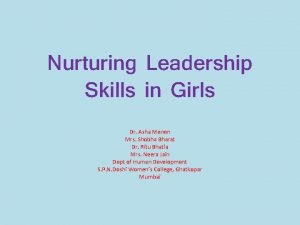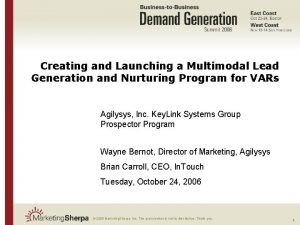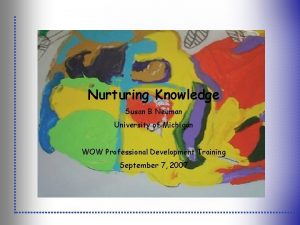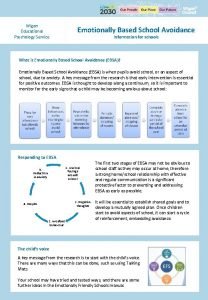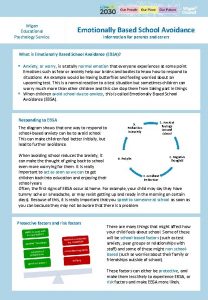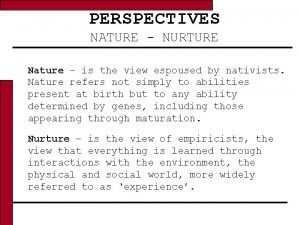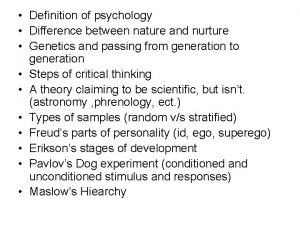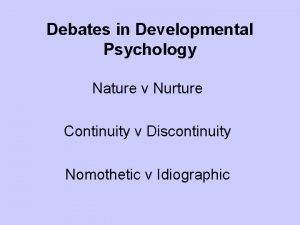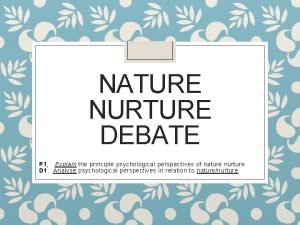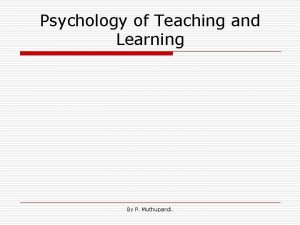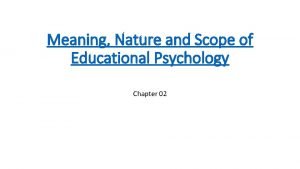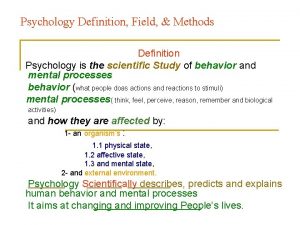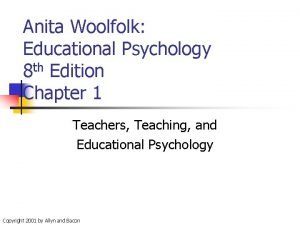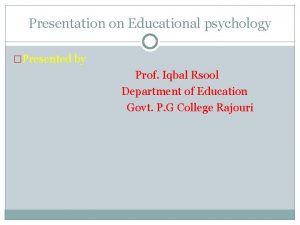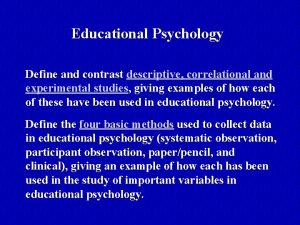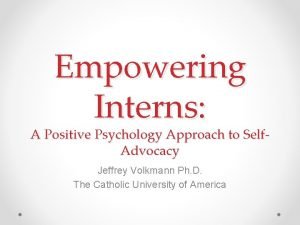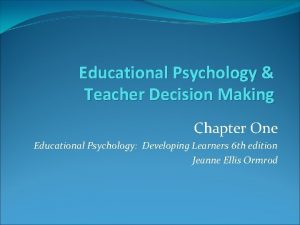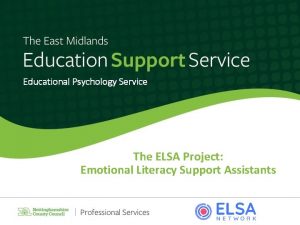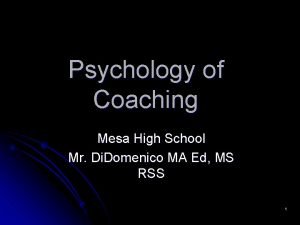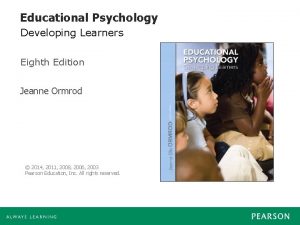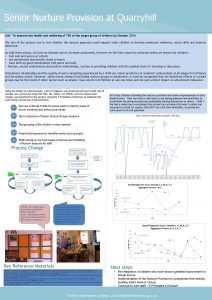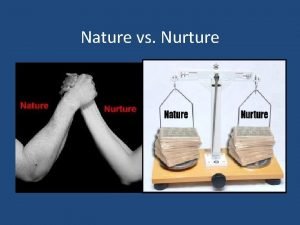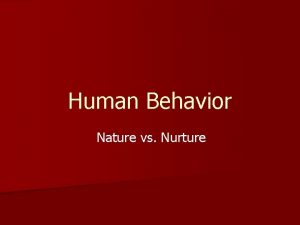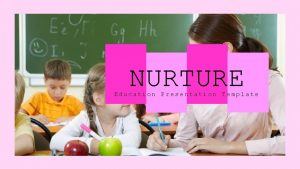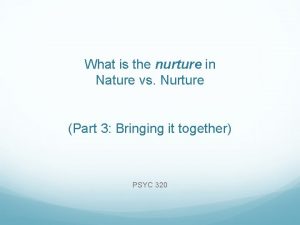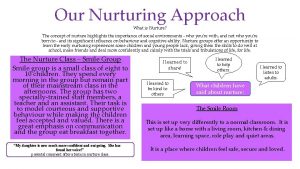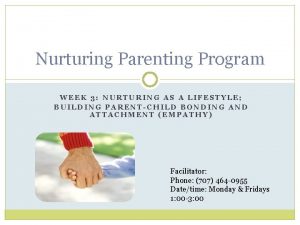Nurturing Principles Educational Psychology Service Nurture Steering Group

































- Slides: 33

Nurturing Principles Educational Psychology Service Nurture Steering Group Susan Morrison, Gail Hendry, Educational Psychologists Additional Development by Magda Olejniczak, Hannah Bertram and Rhoda Marshall, Educational Psychologists Nick Balchin, Principal Educational Psychologist 1

Course overview Date and time 24/2/2016 - 4: 006: 00 pm Graham High School. 23/3/2016 - 4: 006: 00 pm St Bernadette’s RC PS. 20/4/2016 - 4: 006: 00 pm St Bernadette’s RC PS. 18/5/2016 - 4: 006: 00 pm St Bernadette’s RC PS. TBC October 2016 10 -Mar-21 Content Attachment Who will attend Wave 2 Project Team Assessment of Need for Nurture Boxall Profile Wave 2 Project Team Wave 1 participants who missed Reconnect in November/December Nurturing Principles Wave 2 Project Team Nurturing in Practice. Approaches for Wave 2 Project Team whole school: Nurture Classes, Groups, Spaces and Nooks, Nurture practices in mainstream classes Reconnector Session Wave 2 Project Team Falkirk Council Educational Psychology Service 2

Overview • Review of Attachment Theory • Introduction to the Six Nurturing Principles • Implications for practice and teaching style Falkirk Council Educational Psychology Service 10 -Mar-21 3

Learning Intentions By the end of the session participants should be able to: • Define the six nurture principles • Apply understanding of attachment theory and links this to nurturing principles • Identify ways in which nurture principles can be embedded into classroom practice • Identify evidence based strategies which link to nurture principles and can be implemented within the classroom context 10 -Mar-21 4

Nurture… 10 -Mar-21 Falkirk Council Educational Psychology Service 5

Why focus on Nurture Principles in Education? • Highlights the importance of social environments • Nurture offers opportunity to learn the early nurturing experiences some children and young people lack • Models skills essential for the child to achieve success • Enhances confidence • Promotes skills to do well at school, make friends and deal more confidently and calmly with the trials and tribulations of life, for life. 10 -Mar-21 Falkirk Council Educational Psychology Service 6

The Nurturing Principles Principle 1 Children’s learning is understood developmentally Principle 2 The classroom offers a safe base Principle 3 Nurture is important for the development of self-esteem Falkirk Council Educational Psychology Service Principle 4 Language is understood as a vital means of communication Principle 5 All behaviour is communication Principle 6 Transitions are significant in the lives of children 10 -Mar-21 7

Recap Attachment is one of the most critical developmental tasks of infancy (Dr Joy Osofsky) Every child needs at least one person who is really crazy about him or her (Bronfenbrenner, 1977) Secure attachments provide: • Safe haven & secure base from which to explore & engage And encourage development of: • • • 10 -Mar-21 Trust & confidence that adults will help The ability to manage feelings Coping & problem-solving skills Autonomy Self-efficacy Falkirk Council Educational Psychology Service 8

Nurture Principle One : Children’s Learning Is Understood Developmentally Review of Attachment and Brain development • Activity: Identify what you learned from the session on attachment theory and how this impacts on children’s development • Identify implications for practice and teaching style Falkirk Council Educational Psychology Service 10 -Mar-21 9

Brain Scan of 3 year olds Falkirk Council Educational Psychology Service 10 -Mar-21 10

Nurture Principle One : Children’s Learning Is Understood Developmentally • If children live in a chaotic or threatening world, one in which their caregivers respond with abuse or chronically provide no response, their brains may become hyperalert for danger or not fully develop. These neuronal pathways that are developed and strengthened under negative conditions prepare children to cope in that negative environment, and their ability to respond to nurturing and kindness may be impaired (Shonkoff & Phillips, 2000). 10 -Mar-21 Falkirk Council Educational Psychology Service 11

Nurture Principle One : Children’s Learning Is Understood Developmentally The Impact Of Trauma on development Potential challenges with self monitoring and self –regulation Impulsivity, inconsequential behaviours, attentional control Impact on social, emotional and cognitive development Difficulties engaging with typical reward/sanction models of intervention productively and meaningfully. If rewards are not achieved we as practitioners are in danger of reinforcing the child’s negative representation e. g. “I am bad, I am worthless” • All children need relationships to thrive; traumatised children need relationships to heal (Bowlby & Hughes, 2013) • • Falkirk Council Educational Psychology Service 10 -Mar-21 12

Nurture Principle One : Children’s Learning Is Understood Developmentally Role of Key Adults: Dependency • Genetic predisposition to form strong attachments • Neglect or repeated trauma – impacts this ability • Lack of activation of neural connection leads to diminished capacity • Early attachment experiences forms the blueprint of future relationships • Impact on behaviour – research indicates a need to change approach to managing behavior Falkirk Council Educational Psychology Service 10 -Mar-21 13

Nurture Principle One : Children’s Learning Is Understood Developmentally Considering A Relational Or Behaviourist Approach “If relationships are where things developmentally can go wrong, then relationships are where they are most likely to be put right. ” Howe, 2005 Falkirk Council Educational Psychology Service 10 -Mar-21 15

Nurture Principle 2: The Classroom Offers A Safe Base Activity • Story of Ben– what do you the response may have been and the impact of that response? • If you had a visitor to your class, how would they know that a safe base had been created (what would they see? What would pupils experience? ) • What makes you feel safe and that you belong? • In groups using the flip chart paper provided record your thoughts and ideas 10 -Mar-21 Falkirk Council Educational Psychology Service 16

Nurture Principle 2: The Classroom Offers A Safe Base • A welcoming and safe environment for everyone which permeates beyond the classroom and is evident in all aspects of the school environment. • The child will be claimed and kept in mind at all times • Set boundaries and predictable routines. Expectations are clearly articulated and delivered. Staff respond to pupils fairly and sensitively providing clear rationale and supportive commentary. Emotional warmth is key even when the message may create conflict or be difficult to process. Falkirk Council Educational Psychology Service 10 -Mar-21 17

Nurture Principle 2: The Classroom Offers A Safe Base • Staff will demonstrate effective attunement. They will be highly sensitive to the child’s need and support potential escalation through use of positive body language and ‘wondering aloud’ • Visual support to delineate change and provide structure to the day. • Support, modelling and guidance by key adults • Active promotion of nurturing relationships for all children 10 -Mar-21 Falkirk Council Educational Psychology Service 18

Break 10 -Mar-21 Falkirk Council Educational Psychology Service 19

Nurture Principle 3: Nurture Is Important For The Development Of Self -Esteem If you have an envelope on your desk – can you open it, read it and put your hand up Thank you in advance 10 -Mar-21 Falkirk Council Educational Psychology Service 20

10 -Mar-21 Falkirk Council Educational Psychology Service 21

Nurture Principle 3: Nurture Is Important For The Development Of Self-esteem The overall approach should balance the need to support self-esteem and provide challenge and develop resilience as appropriate Activity • In pairs: Consider a time of personal challenge which you feel comfortable with sharing • Reflect on the social implications and emotions attached to this situation • Which factors were important in resolving this challenge. • What do you notice? Falkirk Council Educational Psychology Service 10 -Mar-21 22

Nurture Principle 3: Nurture is important for the development of self-esteem • Reinforcement and feedback is clear and consistent with task • A high level of positive attention and commentary. Focus placed on incremental progress : Joint target setting and review • Identifies and shares personal achievements • Celebration of success: Consistent concrete feedback to enhance social and emotional competencies • Build opportunities for success – notebooks • Support is given to gently challenge negative representations to re-frame stories and build skills and strengths. Falkirk Council Educational Psychology Service 10 -Mar-21 23

Nurture Principle 4: Language is understood as a vital means of communication In pairs discuss the comment on your desk Reflect on the impact this communication may have on the young person How would you re-frame this communication into a nurturing interaction? Falkirk Council Educational Psychology Service 10 -Mar-21 24

Nurture Principle 4: Language is understood as a vital means of communication • All communication should rooted in nurture. Development of respectful, consistent positive interaction. • Clear articulation of expected behaviours: Careful listening, clarifying, summarising, checking out. • Children and young people are given the appropriate level of support and challenge to develop these behaviours and these opportunities should be noted in planning. • Language is framed to support with the expression of emotions. • Language used is clear, explicit and developmentally appropriate. • Communication should envelope core strands of nurturing communication: Claiming, Attunement, Resilience, Emotional Regulation and Social Skills Development Falkirk Council Educational Psychology Service 10 -Mar-21 25

Nurture Principle 5: All Behaviour is Communication Personal and group task from Session Two • Initial Reactions to the assessment tools - e. g. user friendliness, time, relevance, challenges • What were your key findings and how would you relate these findings to the nurture principles and understanding of attachment theory. 10 -Mar-21 Falkirk Council Educational Psychology Service 26

Nurture Principle 5: All Behaviour is Communication Behaviours can mask true feelings In state of flux – expectations of different environments Adult emotional reaction to the behaviour – how this links to our communicative behaviour Be curious – don’t look at behaviour in isolation Reflection on contextual factors Peer support, case conferencing to unpack the function of the behaviour Falkirk Council Educational Psychology Service 10 -Mar-21 27

Nurture Principle 6: Transitions Are Significant In The Lives Of Children In small groups consider how many transitions our young people may have to negotiate in one day. • Nursery • Primary • Secondary Consider the impact this has on social, emotional and cognitive development Consider the impact this may have on a young person with attachment related difficulties Falkirk Council Educational Psychology Service 10 -Mar-21 28

Nurture Principle 6: Transitions Are Significant In The Lives Of Children • There is a high level of awareness of transitions and disruptions in the lives of children and young people, in planning and providing for the meeting of needs • Transition points, internal and external, are well managed. • Appropriate information is shared and, where necessary, there is high quality agency and family work • There are clear welcoming predictable routines at transition points • Where appropriate, there are opportunities to touch base with key staff early in the day and before leaving. • Children and young people are consulted about changes to routines and are supported to cope with these Falkirk Council Educational Psychology Service 10 -Mar-21 29

Learning Outcomes • Practitioners can define the six nurture principles and identify concrete links to practice • Practitioners can apply understanding of attachment theory and link this understanding to the six nurture principles • Practitioners can identify ways in which nurture principles can be integrated into daily classroom practice • Practitioners can identify strategies which link directly to the six nurture principles 10 -Mar-21 Falkirk Council Educational Psychology Service 30

Any questions? 31

Session Three: Learning tasks Group Task 1 • Reflection on key themes from session three: Key themes from today will be collated and forwarded to you next week to support your reflection Group Task 2 • Complete a school audit of how pupils are supported through transitions. Identify three strengths and three areas of development Individual Task 1 • Observe and note 6 verbal interactions. Reframe interactions into nurturing statements. Provide reflection to support why you feel they are examples of nurturing communication Individual Task 2 Consider the same two pupils from session one. Reflect on nurture principle one and three. Note what do you say and do to ensure that these nurture principles are evident in practice 10 -Mar-21 Falkirk Council Educational Psychology Service 32

Support between training sessions Please e-mail ias@Falkirk. gov. uk and a member of the Psychological Service Nurture Group will contact you. 33

Suggested reading and references • Settling to Learn Dan Hughes and Louise Bomber • Attachment in the classroom Heather Geddes • Learn the Child: Helping the looked after child to learn Kate Cairns and Chris Stanway • http: //www. nurturegroups. org/introducing-nurture/six-principlesnurture 10 -Mar-21 Falkirk Council Educational Psychology Service 34
 Nurturing leadership qualities
Nurturing leadership qualities Lead nurturing for charter schools
Lead nurturing for charter schools Lead nurturing reseller
Lead nurturing reseller Yvonne monaghan
Yvonne monaghan Nurturing school
Nurturing school Supplementary nurturing
Supplementary nurturing Susan b neuman
Susan b neuman Wigan educational psychology service
Wigan educational psychology service Emotionally based school avoidance hampshire
Emotionally based school avoidance hampshire Nurture definition psychology
Nurture definition psychology Nature and nurture
Nature and nurture Nurture psychology definition
Nurture psychology definition Nature v nurture psychology definition
Nature v nurture psychology definition Continuity vs stages examples
Continuity vs stages examples Nature-nurture debate
Nature-nurture debate Nature versus nurture debate
Nature versus nurture debate Maintenance steering group 3
Maintenance steering group 3 Sistema de direção
Sistema de direção Scope of educational psychology slideshare
Scope of educational psychology slideshare Concept nature and scope of educational psychology
Concept nature and scope of educational psychology Field psychology definition
Field psychology definition Educational psychology theory and practice
Educational psychology theory and practice Woolfolk educational psychology
Woolfolk educational psychology Educational psychology conclusion
Educational psychology conclusion Define educational psychology
Define educational psychology Positive psychology internships
Positive psychology internships Discuss briefly the nature of educational psychology
Discuss briefly the nature of educational psychology Educational psychology
Educational psychology Educational psychology
Educational psychology Cie
Cie Educational sport psychology specialists
Educational sport psychology specialists Ormrod educational psychology
Ormrod educational psychology Learning through design and technology
Learning through design and technology Disclaimer - video is for educational
Disclaimer - video is for educational
